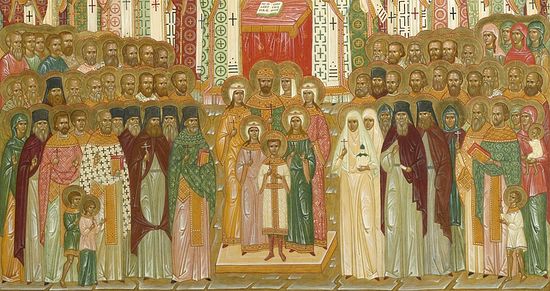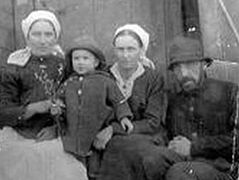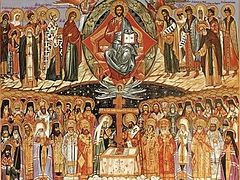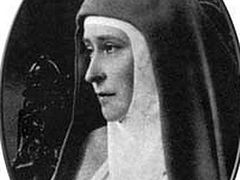In the name of the Father, the Son, and the Holy Spirit.
Today is a very special day for all of us. We are celebrating the memory of the holy New Martyrs and Confessors of the Russian Church, during the 100th year after those terrible events that turned the life of our entire country upside down. They touched the fate of each person without exception living in our fatherland, their descendants all the way down to us and our children. That is how grandiose and terrible these events were in February 1917.
One hundred years ago, something happened that resulted in a martyric Golgotha for all of Russia and the Russian Church. I will not talk about the influence it had on the whole world—this is a particular subject, but also absolutely obvious. Today we will only be talking about our fatherland, Russia. Then occurred that very division into right and left, the sheep and the goats, those who were received by Christ and those who rejected Christ and were themselves therefore rejected by Him.
We are celebrating the New Martyrs in a special way also because we are building a church dedicated to them. A church is of course dedicated to the Lord God and Savior Jesus Christ and the Holy Trinity, but this church of God is being built in memory of the New Martyrs of the Russian Church.
Today is also the day of the publican and the Pharisee, the day on which the Church reads this part of the Gospels telling about them.
Of course, the New Martyrs were humble. Of course these New Martyrs were those very publicans; it couldn’t be any other way—otherwise they would not have been accepted by God. But what did they repent of? Naturally, of their own personal sins—that goes without saying. They brought forth repentance over those sins that all of us have. But they also repented of one terrible sin: None of them could understand that they were precisely the ones who had brought up the Russia that rebelled against God, against all human foundations. Who taught the Law of God? Who gave sermons in the churches? Who taught the Law of God to these future theomachists? The holy New Martyrs. They did not deny their responsibility for this.
Who often—not always, but often—welcomed all the unrest that was happening in the Russian Empire? Who complained about and judged very many things that they would later bitterly remember? The New Martyrs, and people of like mind with them, would remember trifles, or their own mistakes.
These were terrible times, dear brothers and sisters. Now, looking back, as much as that possible for us to do, at those terrible, insane—truly insane—times, we cannot but wonder at the blindness of the majority of our compatriots—the majority! Including those who would in the future be glorified as new martyrs, those who redeemed their blindness, their terrible error.
February 1917. With what exaltation did a significant part, if not the majority, of the people of Russia greet the emperor’s abdication, and those seemingly rainbow-colored prospects that were supposedly opening up for Russia! For 200 years the Church was enslaved, as one of the Church’s hierarchs said. And now the time had come for the great and long-awaited freedom. My God, what happiness!
March 1917. This was a member of the Holy Synod and future hieromartyr Metropolitan Arseny (Stadnitsky) of Belgorod. And many others thought this way. Just imagine to what inner obfuscation and error they could have come. From the hall of the Holy Synod, that very Holy Synod, Metropolitan Arseny (Stadnitsky) along with the new Over-Procurator Lvov triumphantly carried away the chair in which the emperor usually sat. Moscow exalted, Petrograd exalted, and the whole country was exalting. At that moment they were truly the blind leaders of the blind.
The whole country, its whole Orthodox part, was before the revolution studying the Law of God, and everyone went to Communion. But this means that there was something very wrong, something was the subject of an enormous mistake in the Church institution of that time. Legalism and formalism.
Today we read about the publican and the Pharisee… Formally fulfilling the teaching of the Law of God, formally performing the Liturgy, the rites—all of this leads to the most terrifying consequences. And the Church was destroyed by the larger part of its constituents. Of course there were the simple folk, the believing people, that’s all understood. We are not talking about them right now. The churches were destroyed under their authority, usually under the authority of people who knew the Law of God, people who regularly took Communion, people who went to Church, who considered themselves members of God’s body.
Today, when we remember those years, we can’t help but think: What can we do so that this never happens again? This is a particular discussion. Life tends to repeat itself. Mistakes are repeated. Formalism is repeated, ecclesiastical bureaucracy repeats itself, which suddenly becomes the main thing in Church life. The same errors are repeated…
But nevertheless we celebrate the New Martyrs and Confessors of the Russian Church, including those who erred in their time, because through their faith in Christ, by understanding their mistakes, they were able if only on a personal level to redeem those errors and mistakes; to bring repentance to God, and to become the foundation of the reborn Church. We cannot even imagine how great, how total the illusion was concerning the new life. Everyone, or at least the vast majority, unfortunately was in a state of terrible, insane daydreaming. I will read to you by way of example, so that you would understand the level of delusion. March 1917. Tserkovny vedomosti (Church news): “The Synod is sending out its leaders for preaching.” Just think about it—we are separated from all of this by time, and well understand what happened afterwards. “Our motherland is experiencing great days. The old regime has led our country to the edge of destruction. And now the people have risen up for truth, for Russia. The old government, through whom God punished the people for serious, great sins, has been overthrown. Now the people want to build their lives themselves, so that life would be easier, to live according to God’s truth. The great gathering that has come to power will establish a new form of government that will resolve all important problems.” All important problems… “It will do away with all the evil that is left from the old establishment. For peasants, the problem of land will be resolved and everything that concerns the peasantry will be taken care of; workers will be paid worthily for their work, and everything will be done so that every oppressed and needy person in the whole world will live easily and joyfully. And with us there will no longer be unrighteousness, violence, or deceit, and everything will be done according to total justice.”
How can we relate to this now? It’s terrible to even read such lines. And we, brothers and sisters, have no guarantee against similar madness. Of course, even in those times there were people who understood perfectly what this was all leading to. First of all because they read what St. Tikhon, Patriarch of Moscow wrote: “The new government is being established without God.” These were the main criteria. These were the very words of St. Tikhon. The new government is being established without God, and nothing good can come of it. It might be powerful, like Babylon during the time of Nebuchadnezzar, who captured Israel. But it will be terrible for people. And it will collapse, sooner or later. And that is just what happened.
Great people in the Church, the hierarchs, priests, and of course monks (and there were many of them, glory be to God) warned about what would come, about these delusions; but during those first, heady months, after the toppling of the emperor, and the conspiracy against Russia and the emperor, their voices went practically unheard. No one believed them. There were such people. Holy Hieromartyr Seraphim (Chichagov), the great hierarch Antony Khrapovitsky, and many, many others. More heard was the voice of what I have just read to you. The majority of those hierarchs—those who welcomed the revolution, who were in a state of blindness, along with those who knew perfectly well what awaited Russia—endured a suffering, martyric crown. They were all united by faith and suffering for Christ. They were united by the common repentance of the publican: God be merciful to me, a sinner. We were unable to do what we should have done. We were unable to educate God’s people. We were unable to educate our own children. And that is why, as it says in the Gospels, nation shall rise up against nation, and kingdom against kingdom, and children against their parents, because the devil works in this world, and we are unable to rise up in our Christianity to the strength needed to overcome. But we hope in God’s mercy, which will nevertheless lead those people, whoever wants to remain faithful to Him, out of their error, and lead them to salvation and eternal life, to which He directs all His people, all His disciples.
Today we also mark the memory of Fr. John (Krestiankin), and this especially comforts us in these hours when we so sadly remember the events of 100 years ago. He was born seven years before the revolution. And he experienced with his own life the events after the revolution, the terrible persecutions. Glory be to God, by that time no one was any longer under that former delusion. It was excruciatingly difficult to live, and no one had any illusions. They had sobered up. Glory be to God, they were continually bringing repentance to God for not preserving the portion of the Mother of God that they had been given. And therefore such great builders of the Church as Fr. John (Krestiankin) were cultivated. Such great ascetic laborers, the center of whose lives stood, of course, not formalism, not ritualism (although they loved the rites and fulfilled them), but in the center of their lives remained the most important thing. Rites couldn’t always be fulfilled because the churches were being destroyed, they couldn’t have cross processions because it was against the law; but communion of the soul with God is something that no one can take away from a person. And people finally understood, not just with their minds but with their whole lives, that this is absolutely the most important thing. This is the most important lesson, brothers and sisters, of our New Martyrs. Nothing can separate us from the love of God. This bond of love between man and God is the most important thing in our lives. Everything else can fall apart, everything else can and will be changed, but we must hold on to this most important thing with all our strength. Regardless of our weaknesses and errors, if love of God, if communion through love of the Lord God remains, then we will be invincible. This is the most important thing.
Through the prayers of the New Martyrs and Confessors of the Russian Church, may we be blessed to meet this year in profound contemplation, not deceiving ourselves, not building new illusions, but rightfully looking at history and at our own lives. And may the Lord bless us to glorify fittingly the New Martyrs and Confessors of Russia, who endured inhuman sufferings, who brought forth very special repentance; and through their prayers may God have mercy on us and strengthen us. Let us hope, brothers and sisters, although we understand that we can’t know the future, but let us hope that we will meet the consecration of the new church, and that we will celebrate the next feast of the New Martyrs in the new church dedicated to them. Amen.




